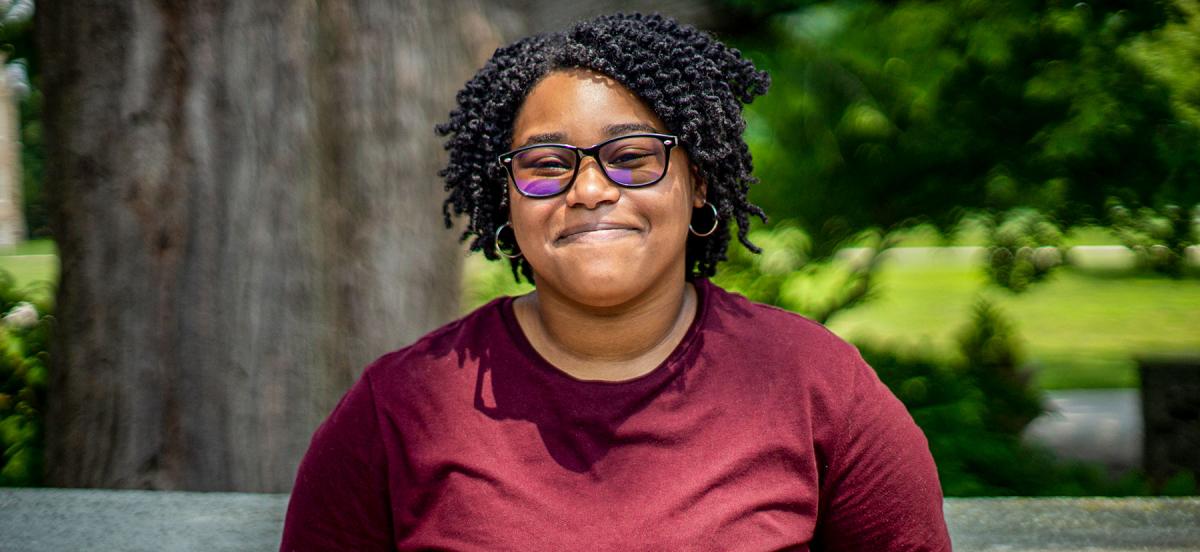Summer Centered: Taylor Johnson ‘24 Documents the Life of Ira De Augustine Reid

Photo by Bilge Nur Yilmaz '21.
Details
The prospective sociology major is working with a documentary team to produce a film on the life of one of Haverford’s most important figures.
This summer, Taylor Johnson ‘24 is spotlighting one of the most important figures in the history of Haverford College. Supported by the Lutnick Library, the prospective sociology major is working with Haverford’s Quaker & Special Collections as Haverford’s first ever Ira De Augustine Reid research intern. She is working with a documentary team, led by a group of alumni and faculty, to produce a film on the life of Reid, who became Haverford’s first Black professor in 1947 and chaired the sociology and anthropology departments from 1948 until his 1966 retirement. Johnson’s primary task is to conduct research on Reid using various resources.
“When I am on-site, I spend my day sifting through primary documentation either written by or about Dr. Reid from his peers regarding his academic accomplishments, letters to his colleagues, his hardships, and his travel expeditions,” said Johnson. “When I am remote, I spend my day searching for information that has been scanned into a digital format, or by reading through journals that Reid has written and published through Phylon, an academic scholarly journal platform. I organize all of the information I gather from these resources and categorize them into different documents and folders for my supervisor and the documentary team to review,” said Johnson.
Johnson learned about the internship from a friend, Luigie Febres ‘22, who knew Johnson was looking for more opportunities to study Black achievement and Black advancement. “While I have been enjoying the majority of the readings presented in my sociology classes so far, we have only covered a few chapters of writing by a Black author, and I was eager to be presented with further representation,” she said. The opportunity to work with a documentary team also enticed Johnson, who had experience filmmaking in high school.
Johnson works alongside Archivist and Records Manager Elizabeth Jones-Minsinger, who has been helpful in supporting her research. “[She] has been great about providing me with ideas of resources to look at when I am on-site and need to look at physical documents, and when I am remote and can search for digital aids,” she said. Johnson also works closely with the leaders of the documentary team: Steven Bailey ’69, Stephen Washburn ’69, James Pabarue ’72, professors Roger Lane and William Williams, and Assistant Dean of Multicultural Affairs Denise Allison.
The research has proven to be a rewarding experience, even when the progress is slow going. “I think that it’s amazing that I’m able to start my day with the intention of searching for one specific piece of information, and ending my day having found that and then some,” she said. “On some days, I am not so lucky with finding information that is relevant to what the documentary team has requested I search for, which can be very frustrating, though I always end up learning more about the foundation of the College or differing perspectives on U.S history that captivates my interest instead.”
In her research, Johnson has found herself connecting with Reid’s passion for advocacy through social work. She has also learned very specific information about his life: the accusations of communism he faced, his love for music and entertainment, the chrysanthemums in his home gardening, and his avid traveling are the details she found most interesting. Johnson was surprised by Reid’s achievements and relationships with other Black historical figures.
“It’s been amazing to read about all of the advancements he’s made and advocated for Black communities and the respect that he’s garnered from his colleagues—most notably, his connections to W.E.B Dubois and Martin Luther King, Jr.—and I’m honored to have been given the opportunity to attain this level of insight,” said Johnson.
In her short time at Haverford, Johnson has helped advance the Bi-Co’s Africana Studies programming for students interested in the department. Reid’s work has inspired Johnson to continue to push for more representation in Haverford’s faculty and curriculum.
“With this work, I feel that I am making a positive contribution to Black advancement through doing my best to guide those that are interested in strengthening their identities, and through cultivating ways for my people to flourish in all facets of life that we are able to offer through our programming,” she said. “I am able to use Dr. Reid as another role model for me to look to for encouragement, but he also serves as a reminder that there is still much to be done to expand the ways in which Black individuals are viewed in terms of academia, and to ensure the progression of traditional society as a whole as Black individuals continue to thrive with our contributions to it.”
The documentary team will begin filming later this summer. Currently, they are calling out to alumni who want to share their memories of Dr. Reid.
“Summer Centered” is a series exploring our students’ campus-supported summer work.



